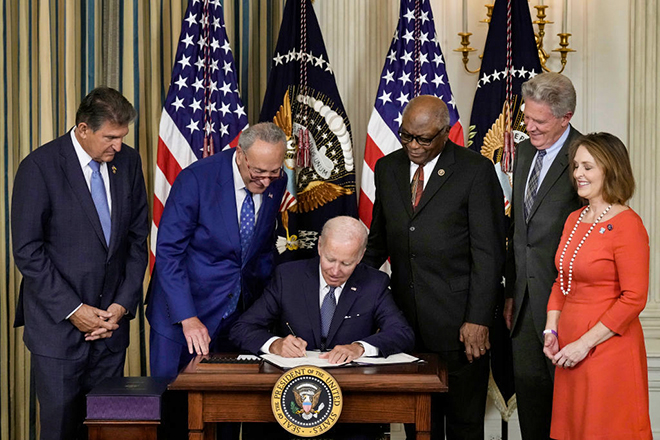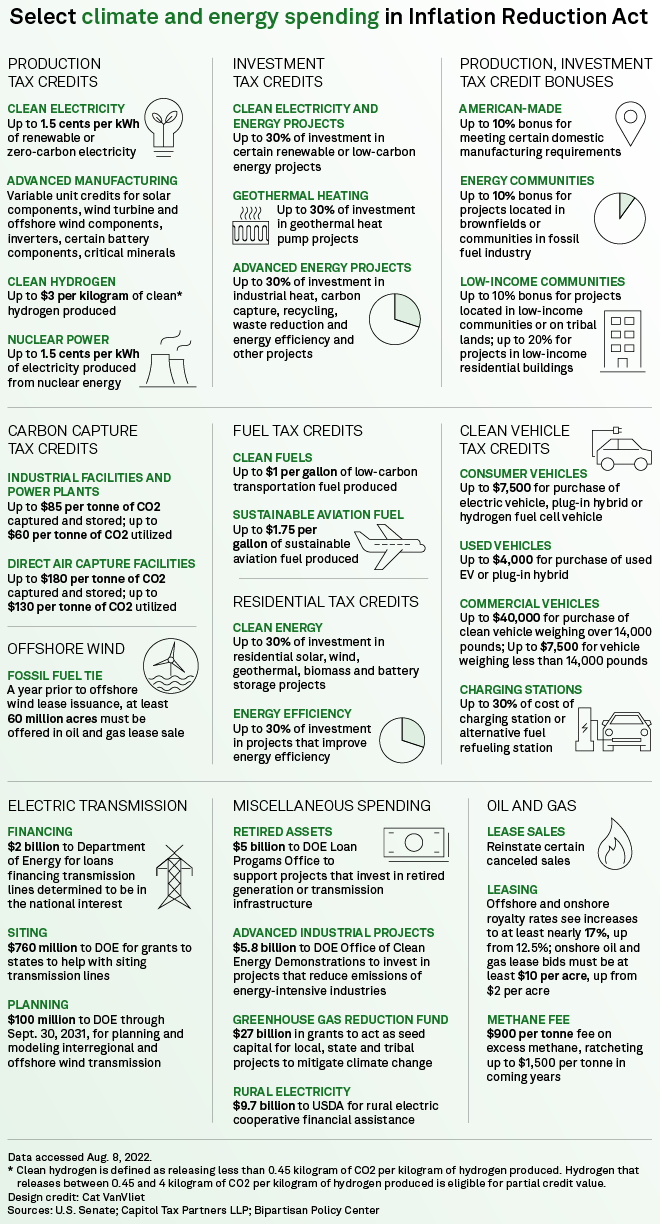
| U.S. President Joe Biden signs the Inflation Reduction Act on Aug. 16 while members of Congress look on. Drew Angerer/Getty Editorial via Getty Images |
U.S. President Joe Biden on Aug. 16 signed the Inflation Reduction Act, a comprehensive energy and climate law that allocates nearly $370 billion in federal spending to decarbonization efforts over the next decade.
"This bill is the biggest step forward on climate ever … and it's going to allow us to boldly take additional steps toward meeting all of my climate goals," Biden said during a bill-signing ceremony at the White House.
The law's passage represents an abrupt turnaround from just a month ago, when Sen. Joe Manchin, D-W.Va., came under heavy criticism for his reported refusal to support a scaled-back version of House Democrats' now-defunct Build Back Better Act.
Manchin at the time pointed to a 9.1% year-over-year jump in U.S. inflation data, calling for a wait-and-see approach based on the next monthly inflation print.
Observers in Washington, D.C., were caught off guard when Manchin on July 27 announced a budget reconciliation deal with U.S. Senate Majority Leader Chuck Schumer, D-N.Y., that preserved most of the energy- and climate-related provisions in the Build Back Better Act.
The law will also expand healthcare benefits and is projected to reduce the U.S. budget deficit by about $300 billion in its first nine years.
Senate Democrats passed the Inflation Reduction Act on Aug. 7 with Vice President Kamala Harris casting the tie-breaking vote, allowing them to advance the bill to the U.S. House of Representatives with zero votes to spare. House Democrats sent the bill to Biden's desk on a straight party-line vote five days later.
Climate experts estimate the new law will enable the U.S. to cut its economywide emissions by 40% by 2030 relative to 2005 levels. That would put the nation within striking distance of Biden's 50%-by-2030 commitment made under the Paris Agreement on climate change.
Policy analysts say additional policies, such as federal regulations targeting methane emissions and emissions from the U.S. transportation sector, can bridge the rest of the gap.
The Inflation Reduction Act represents the largest single investment in energy and climate measures in U.S. history, Biden noted during the Aug. 16 ceremony.
The legislation includes tens of billions of dollars in spending over 10 years to support domestic clean energy and transportation manufacturing, renewable energy development and production and U.S. electric grid expansion. It also creates new tax credits for existing nuclear plants, stand-alone energy storage and clean hydrogen production.
The law provides a federal consumer tax credit of up to $7,500 on new electric vehicle purchases from U.S. automakers. Some of the law's most generous tax provisions, such as federal EV subsidies and bonus renewable energy tax credits, are contingent upon companies meeting tough new domestic sourcing and labor requirements.
In negotiating the budget reconciliation deal, Manchin secured a side agreement with Democratic leaders to pursue separate action on permitting reform by a Sept. 30 government funding deadline.

S&P Global Commodity Insights produces content for distribution on S&P Capital IQ Pro.



